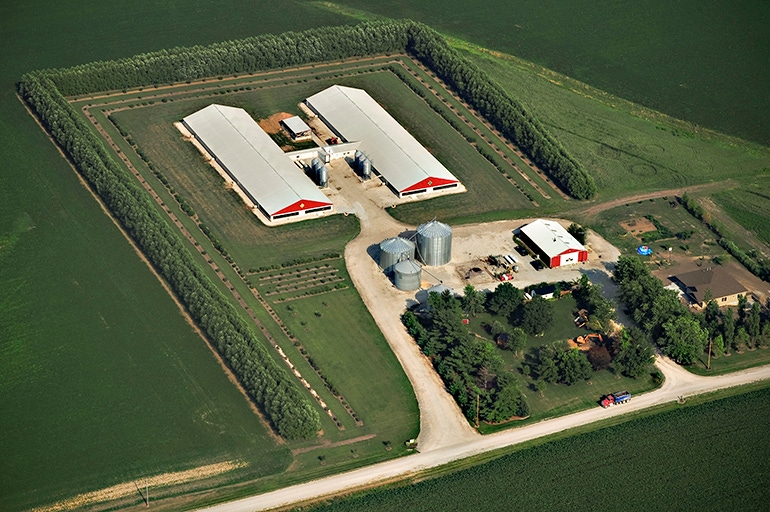Court cases can be a nuisance for producers
Iowa jury rules in favor of hog operation

Hog farms and nuisance complaints seem to go together. It doesn’t have to be that way, though.
Eldon McAfee, attorney with Brick Gentry PC, spoke to pork producers at the recent Iowa Pork Congress about practical aspects of compliance with Iowa Department of Natural Resources regulations and other environmental concerns, as well as the status of nuisance cases currently on the book in the Hawkeye State.
McAfee says there are currently 11 court cases pending in Iowa. A 12th case, in Wapello County, culminated Feb. 29 with a jury verdict ruling in favor of JBS Pork. A group of nine residents had sued, saying that odors from the hog barns contracted by JBS Pork made it impossible for them to enjoy their property.
According to KTVO in Kirksville, Mo., Judge Annette Scieszinski read each of the nine verdicts, as the jury answered the question: Is the operation of the CAFO on the Warren farm a nuisance upon each of the plaintiffs. To each, Scieszinski read the jury’s answer of “No.” The plaintiffs were seeking up to $750,000 each in damages, and the verdict is expected to be appealed.
Many of the others have trial dates set for later this year or early in 2017, while others are still awaiting trials to be scheduled. All but one of the current cases involve swine finishing sites, the other involves a cattle feedyard.
This will comes as a shock to no one, but odor is the No. 1 cause of most nuisance cases “by far, with cases claiming ‘unreasonable interference with use and enjoyment of property’. … anyone filing a complaint against a facility is claiming that odor is interfering with them being able to enjoy their property.” That determination is left up to a jury decision.
All too familiar
Maxwell Farms of Indiana may know nuisance lawsuits better than anyone, having to defend itself against five lawsuits brought by its neighbors based on negligence and nuisance. For the fifth time in the past two years, an Indiana judge has dismissed a nuisance suit filed against hog farmers.
According to a Business Wire article, Randolph County Circuit Court Judge Marianne L. Vorhees dismissed the case against Maxwell Farms of Indiana and local farmers on Jan. 22, granting summary judgment after finding no evidence of negligence on the part of Maxwell Farms or its contracted operators. Four similar nuisance suits against the company were dismissed by Vorhees in 2014.
Gary H. Baise and Anson M. Keller, attorneys with OFW Law in Washington, D.C., represented Maxwell Farms in the five nuisance cases. They co-authored a post on their firm’s website, and said the complaints stated that the basis for the suits was the odor created by the production of hogs, improper handling of manure waste and dead hogs, fly generation and leaks of manure from the barns on to neighbors’ property. Although water pollution was raised, no Clean Water Act violations were alleged.
The defense attorneys write on their website that at the time the lawsuits were filed the four prosecuting attorneys “who were labeled by the newspapers as ‘high-powered,’ were reported as vowing to make Randolph County (Indiana) ‘ground zero’ in a legal fight over how Indiana produces pork.”
The trial court judge, Marianne Vorhees, a special judge sitting in Muncie, Ind., found that the elements of the Indiana Right to Farm statute had been met. The farms had been in existence for more than one year before the lawsuits began, there had been no change in circumstances in the operation of any of the farms and the plaintiffs provided no evidence to show that the farms had been a nuisance at the time the farms began operations.
After a thorough briefing by OFW Law and the Indiana attorney general, Vorhees also found that the Indiana Right to Farm statute was constitutional. The plaintiffs appealed four of the cases but subsequently dropped the appeals. OFW Law moved for summary judgment in all five cases, and at no time did the plaintiffs attempt to show any evidence of negligence or negligent operation of the hog farms in any of the five cases.
Steps to avoid suits
Maxwell Farms has proven hog producers can win nuisance lawsuits that are brought against them, but producers can take measures to hopefully ward off nuisance cases being brought against their operation.
Odor is the primary issue in nuisance cases, but flies are also an issue. It long has been said that if pigs did not smell or attract flies, neighbors would have nothing to complain about. McAfee presented steps to avoid nuisance cases during a presentation at the Iowa Pork Congress in late-January.
McAfee says that an Iowa jury in a nuisance case has to determine a “normal person standard, maybe not that particular person who has filed suit, but the jury has to take a look putting aside the vested interest that both parties have in the case.”
Nuisance cases have increased as urban areas continue to infringe on agriculture areas, with urban neighbors complaining about issues that are just a part of agriculture business, and McAfee says an important distinction is who came first. Surprisingly, McAfee says, “in 20-some years of cases, I think one of those was where the producer was there first, and that’s a very important factor, and that factor if the plaintiff was there first, the ruling usually goes to the plaintiff.”
As with most any court case, attorneys for both sides gather fact witnesses (parties in the case, family and friends, and independent third parties) as well as expert witnesses, “those who can give a scientific opinion of odor using modeling or monitoring, or property values.”
So, how can producers avoid getting involved in nuisance cases in the first place? Well, McAfee presents a list of steps to avoid a lawsuit, adding the caveat, “that you can do everything on this list and be fine, or you can do everything on this list and still get sued. There is no magic bullet that I know of.”
Location
As real estate agents stress, “location, location, location; separation distance is very important, but in some cases we’re seeing people sue up to a couple miles away,” McAfee says, “I’m not sure how you can prepare for that, but don’t give up. You always need to be conscious of separation.”
McAfee warns that not all separation distances are created equal, and producers need to be aware of the characteristics of the location of their hog site concerning prevailing winds and topography. “when you’re siting your hog operation, not that you shouldn’t be conscious of all neighbors, but pay particular attention to those to the north and northeast of the site because they are the ones in the direction of the prevailing wind direction.”
Tree buffers
“I’m a big believer of the tree buffers,” he says. “from a lawsuit standpoint, I’m a big believer of planting fast-growing trees, I like that tree up there 15 to 20 feet high, and then follow-up with slower growing trees. … research shows that a tree buffer does provide odor protection.”
Ventilation and exhaust fan management
Proper ventilation assures that your pigs are comfortable, and McAfee says “comfortable pigs are clean pigs, and clean pigs has less odor than pigs that are dirty, so don’t sell yourself short on what you do for ventilation and exhaust fan management.”
McAfee says some producers have implemented use of filters, and a lot of university research backs that up, though “filters aren’t necessary in every situation on every farm.”
Mortality handling
Proper handling of mortalities is integral to avoiding lawsuits. “A jury is not going to like hearing about dead pigs lying around,” he says. “what you have to show is that you are handling them properly.”
Overall operational environmental management
“Some producers say it’s not going to do any good to go talk to the neighbors,” he says, “and that may be true, but if you don’t go talk to them, they will always be able to come back with ‘well you never talked to me’. You know what will work in your situation, and try your best.”
That last all-encompassing point covers a lot of issues that go a long ways to can allay issues between hog sites and neighbors as pertaining to manure management (both storage and application) and just keeping up the appearances of clean pigs and clean buildings with curbside appeal of landscaping.
Jay Harmon and Steve Hoff, both Iowa State University professors of Agricultural and Biosystems Engineering, produced a fact sheet “Siting and Building Design Considerations to Reduce Odor Potential from Swine Facilities” to help producers address the issues presented by McAfee. That fact sheets can be found online.
More fact sheets concerning other hog siting environmental issues can be found at the Pork Checkoff website.
Though he is not an insurance salesman, McAfee recommends that producers look at exactly what coverage they have for risk protection. “Standard farm liability policies normally don’t cover nuisance issues, but producers should always check with their insurance company” and/or their attorney. “My advice is do not rely on that (farm liability policies) if you want nuisance protection.”
There are exceptions to all rules, as McAfee discusses a 2013 Illinois case where the court decided that odor from hog manure was not “traditional environmental pollution” and therefore the pollution exclusion in the policy did not exclude coverage for the producer. Another case, this one in Wisconsin two years ago, had a court decision that manure that polluted a well was a pollutant under the insurance policy, and the pollution exclusion in the policy excluded coverage for the producer.
“Insurance is a contract, carefully review the policy terms to make sure you are getting what you are paying for,” he says. “If premiums seem too good to be true, they probably are, and you don’t want to find out when the you-know-what hits the fan that you don’t have the coverage.”
All 50 states have some sort of nuisance defense laws, though the constitutionality of these laws has been challenged in some states. The National Agricultural Law Center has a collection of the states’ right to farm statutes.
About the Author(s)
You May Also Like



